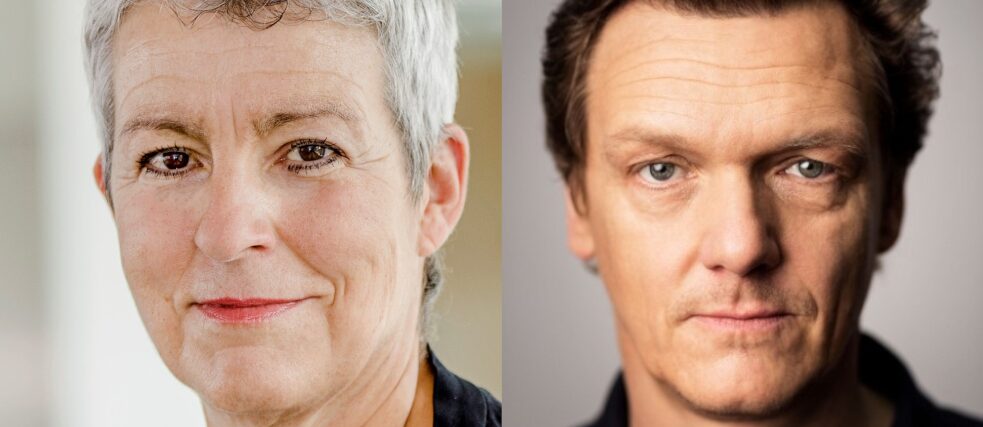Goethe-Medal
"Doing good for people who do good"

As every year, the Goethe-Medal will be awarded in Weimar on 28 August. Carola Lentz, president of the Goethe-Institut, and Thomas Oberender, chairman of the Goethe-Medal Commission, talk in an interview about the history and change of the award, the selection of the laureates and the impact of the official medal of the Federal Republic of Germany.
Carola Lentz, as president of the Goethe-Institut, you award the Goethe Medal every year. Can you further explain what exactly the Goethe-Medal is and why it exists?
Carola Lentz: The Goethe-Medal is an official badge of honour of the Federal Republic of Germany and the most important prize in its foreign cultural and educational policy. Since 1955, the Goethe-Institut has awarded it to personalities from all over the world who have rendered outstanding services to the teaching of the German language or to international cultural exchange. The candidates for the Goethe-Medal are nominated by the Goethe-Institutes around the world in consultation with the German missions abroad. Based on these nominations, the Goethe-Medal Commission develops a selection of award winners, which must be confirmed by the Goethe-Institut’s board of directors. Furthermore, the aim of the Goethe-Medal is to make globally relevant and future-oriented topics as well as actors visible in Germany and thus also to promote the internationalisation of the German cultural landscape. In addition, the award often also sends a positive signal in the countries of origin of the respective award winners and can ensure that the work of the award winners is strengthened.
Thomas Oberender, you have been chairman of the Goethe-Medal Commission since 2022. What exactly is your task?
Thomas Oberender: My role is mainly to manage the meetings, appoint the jury members and coordinate the award programme on site, as well as communication.
What is the composition of the Goethe-Medal Commission?
Thomas Oberender: We try to recruit various experts from the fields of music, film, literature, journalism, and theatre. This year, the eight-member jury was newly composed and, in addition to me as chairperson, consists of René Aguigah, Olga Grjasnowa, Julia Grosse, Anna Henckel-Donnersmarck, Matthias Lilienthal, Antje Rávik Strubel and Andrea Zschunke for the next three years. In addition, a representative from the German Foreign Office, as well as the president and the secretary general of the Goethe-Institut are always present at the jury meeting. Since the jury itself does not submit proposals but discusses the nominations from the regional departments of the Goethe-Institut worldwide, we deal with the submissions in the decisive meeting at the end of October and make our selection based on them.
What do you appreciate about your task? Are there any particularly memorable moments during your time on the selection committee?
Thomas Oberender: Yes, I have learned that the recognition of the work of certain laureates can definitely be an empowerment of their work. At the same time, I have also learned that in the countries of origin, especially if they are not model democracies, people react very sensitively to this cultural-political gesture from Germany. In this respect, it is not only about the ceremony in Weimar, but also about the significance of this award for the honoured in their home countries, and we must communicate this accordingly. Our values are just our values - in Egypt or Senegal, there are completely different things at the forefront. What I personally appreciate about the jury’s work is meeting the work of so many creative people who are on our radar in our search for candidates. The discovery process makes each of us smarter, gives an insight into other cultures, reveals struggles and ideas.
This year, the Goethe-Medal goes to film manager Gaga Chkheidze from Georgia, curator and dramaturg Yi-Wei Keng from Taiwan and the curatorial collective of the OFF-Biennale Budapest from Hungary. What criteria did you place particular emphasis on when selecting the laureates?
Thomas Oberender: With the Goethe Medal, we want to do good for people who do good - from our point of view, this means that they defend liberality and have created a body of work that is exceptional and at the same time effective in the contexts of their work. As a rule, this work is not apolitical, but it is not politics in the immediate sense, but a translation into the language of art.
Carola Lentz: I would like to add to the criteria that the Goethe-Medal is awarded to personalities from abroad, regardless of nationality. Here, the jury pays attention to a balance of countries or regions. Attention is also paid to a good mix of different generations. For the institutes, it may also be interesting to know that candidates from all cultural disciplines are considered, i.e. from the visual arts, dance, choreography, music or literature, as well as personalities from the fields of cultural management, science and languages.
On 28 august, the award ceremony for the Goethe-Medal will take place in Weimar. What do you think Goethe would say about the honour in his name?
Carola Lentz: Our award winners this year are exemplary for the freedom of art and culture in illiberal contexts. They find ways to support independent cultural scenes and promote international cultural exchange despite repression, censorship or nationalism. Therefore, I could imagine that Goethe would have emphasised the high relevance of free spaces and freedom, as he wrote in a letter to his friend Carl Friedrich Zelter: "Freedom is the only good for which it is worth offering up everything."
Thomas Oberender: The Goethe-Medal is basically not only intended to honour an achievement in the past, but to set an example in the sense of a desirable future. Goethe once said of the fairy tale that it "presents us impossible events under possible or impossible conditions as possible." Our award winners have given the conditions in the real world this twist into the possible and this magic would probably have pleased him.
The questions were asked by Miriam Gröning and Jutta Behnen.